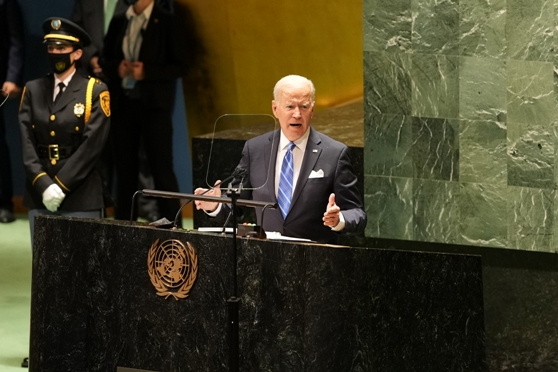In UN debut, Biden calls for global unity against common threats
By Michael D. Shear, David E. Sanger and Rick Gladstone
NEW YORK – President Joe Biden delivered his debut address to the annual gathering of world leaders at the United Nations on Tuesday (21) amid strong new doubts about his ability to vault the United States back into a position of global leadership after his predecessor’s promotion of ‘America First’ isolationism.
Speaking to a smaller-than-usual audience of his peers because of the still-raging COVID-19 pandemic, Biden called for a new era of global unity against the coronavirus, emerging technological threats and the expanding influence of autocratic nations such as China and Russia.
“No matter how challenging or how complex the problems we’re going to face, government by and for the people is still the best way to deliver for all of our people,” he said, insisting that the United States and its Western allies would remain vital partners.
“Our security, our prosperity and our very freedoms are interconnected, in my view as never before,” Biden said.
Calling for the world to make the use of force “our tool of last resort, not our first,” he defended his decision to end the US war in Afghanistan, a chaotic withdrawal of US troops that left allies blindsided.
“Today, many of our greatest concerns cannot be solved or even addressed by the force of arms,” he said. “Bombs and bullets cannot defend against COVID-19 or its future variants.”
But Biden’s efforts to move America past former President Donald Trump’s more confrontational policies come amid growing frustration among allies with his administration’s diplomatic approach.
His familiar refrain that the world must choose between democracy and autocracy looks different now that the Taliban are once again in control of Kabul, reversing many of the democratic gains of the past 20 years. COVID is resurging in much of the world. And the French just recalled their ambassador in outrage — not just over losing a $60 billion-plus submarine contract but also because it was made clear they are not in the inner circle of allies.
Biden and other leaders are gathering in New York City against a backdrop of disastrous climate change, polarized superpower relations and a devastating pandemic that has worsened the global rich-poor divide.
The event is a major test of credibility for Biden, who was among the first to address the 193-member General Assembly. Among the last to speak will be President Xi Jinping of China, via pre-recorded video, bookending a day with the competing views of the two most powerful countries in the world.
Biden said the world faced a choice between the democratic values espoused by the West and the disregard for them by China and other authoritarian governments.
“The future belongs to those who give their people the ability to breathe free, not those who seek to suffocate their people with an iron hand authoritarianism,” he said. “The authoritarians of the world, they seek to proclaim the end of the age of democracy, but they’re wrong.”
But the president vowed not to pursue a new era of sustained conflict with countries like China, saying that the United States would “compete vigorously and lead with our values and our strength to stand up for our allies and our friends.”
“We’re not seeking — say it again, we are not seeking — a new Cold War, or a world divided into rigid blocs,” he said.
Climate change and the pandemic are also expected to dominate the week, and Biden planned to host a COVID summit on the sidelines to push other countries to increase capacity to manufacture vaccines for poor countries.
“This year has also brought widespread death and devastation from the borderless climate crisis,” Biden said. “Extreme weather events that we’ve seen in every part of the world — and you all know it and feel it — represent what the secretary-general has rightly called code red for humanity.”
On COVID, Biden urged leaders to move more quickly to rein in the pandemic that has killed millions.
“We need a collective act of science and political will,” he said. “We need to act now to get shots in arms as fast as possible, and expand access to oxygen, tests, treatments, to save lives around the world.”
-New York Times


